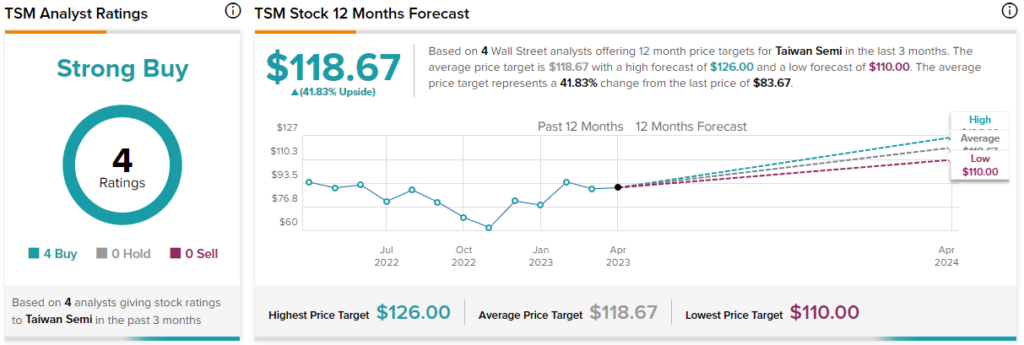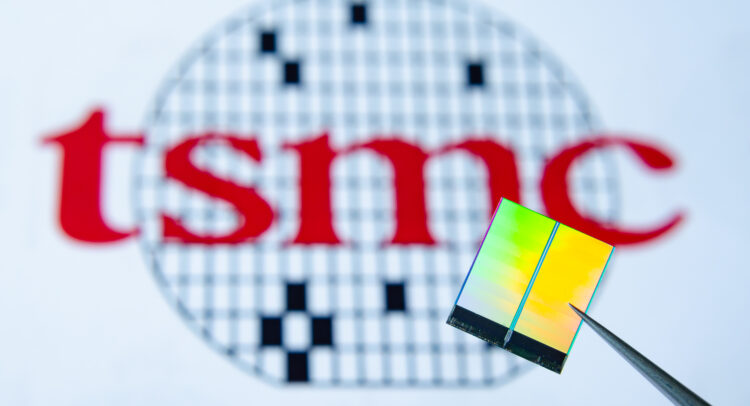Taiwan Semiconductor (NYSE:TSM) reported its Q1 results last week, demonstrating its ability to remain a cash cow despite the seemingly severe geopolitical risks surrounding the company. Nevertheless, concerns over a potential invasion of China to Taiwan, along with fears of declining demand for semiconductors, have spooked investors, resulting in shares giving away some of their recent gains.
Elevate Your Investing Strategy:
- Take advantage of TipRanks Premium at 50% off! Unlock powerful investing tools, advanced data, and expert analyst insights to help you invest with confidence.
Still, I believe that such concerns are likely overblown and find the stock undervalued against its future earnings growth potential. Accordingly, I am bullish on TSM stock.
How Serious is the Risk of a Chinese Invasion of Taiwan?
China’s increasing hostility towards Taiwan’s autonomy undoubtedly puts the company at risk, as a potential outbreak of war could endanger its very survival. With China’s threats becoming more serious and Taiwan’s foreign minister Joseph Wu publicly anticipating an invasion by 2027, it’s not surprising that the markets are viewing this as a significant threat.
Additionally, the fact that Warren Buffett slashed his stake in Taiwan Semiconductor by 86% following the advancement of talks about a potential invasion has further fueled concerns in the markets.
On the opposing side of this argument, China’s threats towards TSM are still just verbal. Thus, I think that refraining from investing in a remarkable company like TSM solely based on these threats may not be the most prudent decision.
Moreover, TSM is currently preparing to invest billions in a new plant in Arizona, further diversifying its operations beyond Taiwan and hence reducing its geopolitical risk. Furthermore, and this is just my personal opinion, given the costly consequences of Russia’s invasion of Ukraine, China might have second thoughts about attacking Taiwan, as the likely involvement of the U.S. could significantly disrupt their strategies and adversely impact their economy.
So overall, while the stock’s decline due to these concerns is not totally unfounded, I don’t perceive them as an immediate threat to the company’s existence. And if I may add, the value of Taiwan Semiconductor’s capabilities is far too crucial for the Western world to allow it to fall under China’s control.
Is Taiwan Semiconductor Experiencing Declining Demand?
Another element that has spooked investors following the company releasing its Q1 results is the possibility of declining demand for semiconductors. This is because the company posted revenue of $16.73 billion, implying a year-over-year decline of 4.8%. That said, some context is required here to get a better understanding of how this decline came to be.
Firstly, foreign exchange headwinds were a significant contributor, as revenues actually grew by 3.6% in constant-currency terms. Secondly, the current year’s performance is being compared to an extraordinary period of growth driven by a surge in semiconductor demand, which led to impressive revenue growth of 35.5% in Q1 of 2022. Hence, it’s reasonable to expect an organic correction as the company’s growth trend normalizes.

Taiwan Semiconductor Remains a Cash Cow
Despite its growth trend normalizing in Q1, Taiwan Semiconductor managed to maintain its exceptional profitability by once again delivering remarkable profit margins.
Specifically, the company’s gross margin was 56.3%, its operating margin was 45.5%, and its net income margin was 40.7%. Even some of the most profitable companies on Earth, whether in big tech or in big oil, are jealous of such margins. Overall, even though earnings per share fell by nine cents to $1.31, the company remains extremely profitable.
To this point, some investors argue that the company’s profitability is set to deteriorate further, as signaled by management’s guidance. Particularly, for Fiscal 2023, management expects the company’s gross profit margin to be between 52% and 54% and its operating margin to be between 39.5% and 41.5%. While these numbers clearly suggest a margin compression versus current margins, they still remain remarkably high.
Moreover, given that this compression is most likely attributable to decelerating sales growth and inflationary pressures, it wouldn’t be unlikely to see a margin expansion in Fiscal 2024 as either or both of these trends potentially reverse.
Is TSM Stock a Buy, According to Analysts?
Despite the ongoing concerns encircling Taiwan Semiconductor, the stock has maintained a Strong Buy consensus rating based on four unanimous Buys assigned in the past three months. At $118.67, the average TSM stock forecast implies 41.8% upside potential.

The Takeaway
Taiwan Semiconductor’s Fiscal 2023 got off to a seemingly lackluster start, as investors were apparently somewhat underwhelmed by the company’s top-line growth. However, upon closer examination of the figures, the company’s performance was actually much more robust than commonly perceived. Moreover, concerns regarding the possibility of a Chinese invasion of Taiwan are likely overstated beyond the actual threat level.
Now, to be frank, TSM’s profitability is indeed going to be compressed this year, as per management’s outlook on margins. Analysts expect that the company will post earnings per share of $5.15 this year, suggesting a year-over-year decline of 21.6%. But what this estimate also points to is that shares are currently trading at forward P/E close to 16.2 (a ~6.2% forward earnings yield), which I find a very attractive valuation given the company’s unique qualities and monopolistic powers. Accordingly, I remain bullish on TSM stock.
















